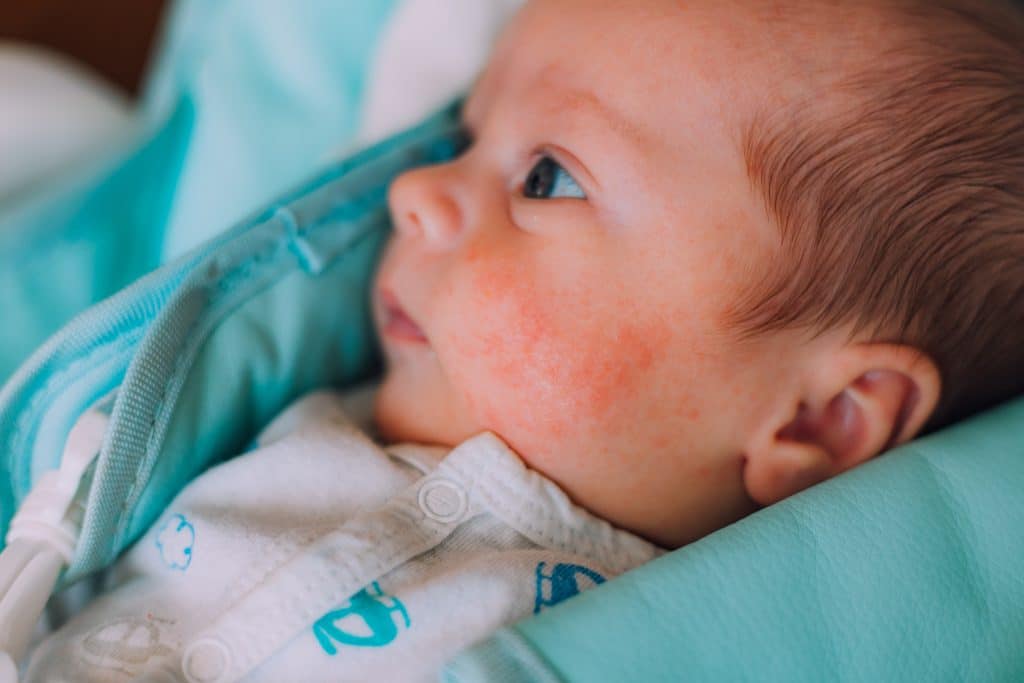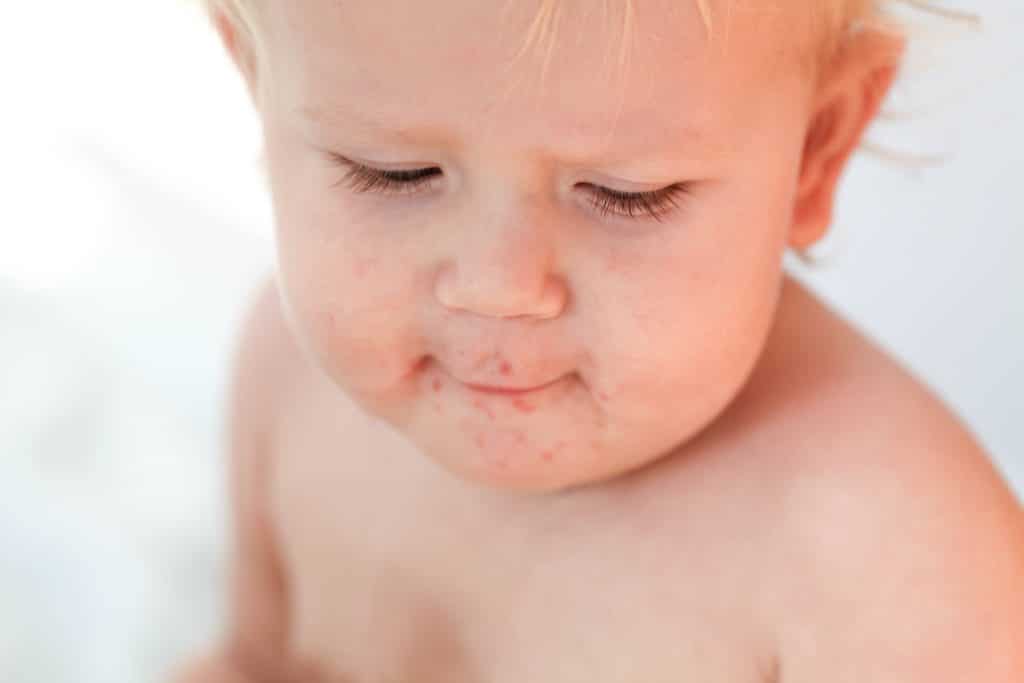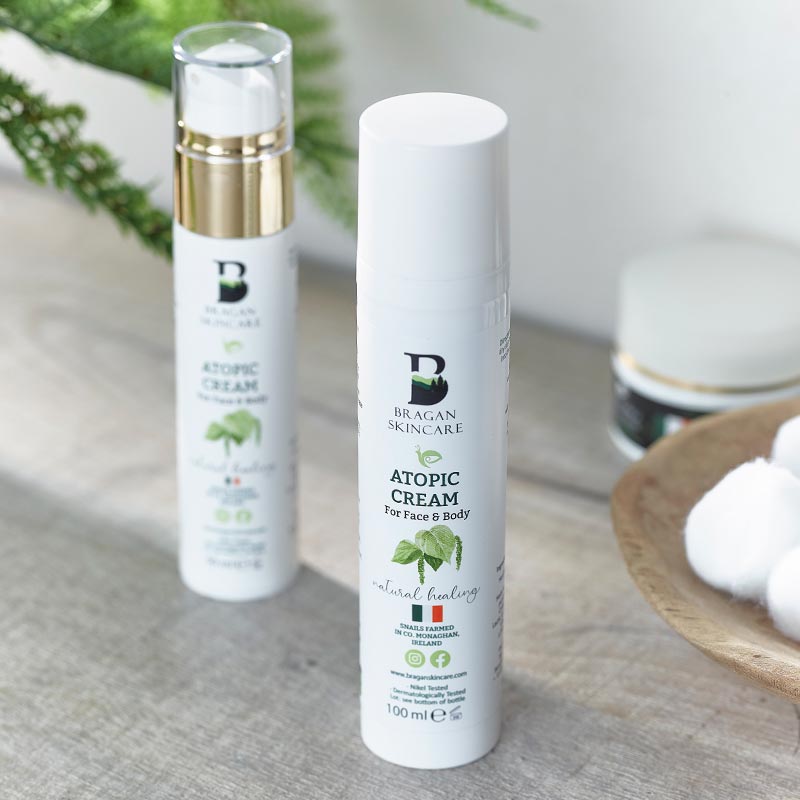Understanding and Managing Infant Perioral Dermatitis: A Comprehensive Guide
Babies’ skin is soft, delicate, and sensitive, which makes it prone to certain conditions like infant perioral dermatitis. This condition can be worrying for parents, especially when it appears as redness or bumps around a baby’s mouth. But with the right care, it’s manageable. In this comprehensive guide, we’ll explore everything you need to know about infant perioral dermatitis, including its symptoms, causes, treatments, and prevention tips.
We’ll also introduce Bragan Skincare’s Atopic Cream, a soothing and effective solution that uses snail mucin to manage this condition. This blog aims to equip you with knowledge and practical advice to care for your baby’s sensitive skin.
For best results, use as part of a complete eczema routine.
Infant Eczema Treatment: What Really Works for Babies

What Is Infant Perioral Dermatitis?
Infant perioral dermatitis is a skin condition that typically shows up as red or pink bumps around a baby’s mouth. It may also spread to the chin, cheeks, or under the nose. In some cases, the affected area may look dry, flaky, or slightly inflamed.
Although it is not dangerous, it can be uncomfortable for your baby, causing mild irritation or itching. It’s important to address the condition early to prevent it from worsening.
Key Symptoms of Infant Perioral Dermatitis
To identify infant perioral dermatitis, look for the following signs:
- There are red or pink bumps near the mouth.
- Dry, flaky patches of skin.
- There is mild redness or irritation surrounding the affected area.
- Rarely, mild itching or discomfort.
People often mistake these symptoms for teething rashes, eczema, or allergic reactions. Observing your baby’s skin closely can help differentiate between these conditions.
What Causes Infant Perioral Dermatitis?
Understanding the triggers behind infant perioral dermatitis can help you prevent and manage it effectively. Here are the most common causes:
1. Drooling
- Excess saliva around the mouth, especially during teething, can irritate the skin.
- Continuous moisture can break down the skin’s natural barrier, leading to redness and bumps.
2. Food Residue
- Leftover food particles around the mouth can irritate the skin.
- Acidic or spicy foods may worsen the condition.
3. Harsh Products
- Soaps, cleansers, or wipes containing artificial fragrances, alcohol, or dyes can cause irritation.
- Even some baby products can be too harsh for sensitive skin.
4. Eczema
- Babies with eczema are more likely to develop perioral dermatitis due to their already sensitive and compromised skin barrier.
5. Environmental Factors
- Wind, cold weather, or extreme heat can dry out the skin, making it more prone to irritation.
- Exposure to allergens like pollen or dust can also exacerbate the condition.
Understanding the Sensitive Skin Barrier in Babies and Its Role in Eczema
Babies have incredibly soft and delicate skin, but this same feature makes their skin more vulnerable to irritation and certain conditions, such as eczema. The skin barrier serves as the body’s primary defense mechanism. Let’s explore what the skin barrier is, why it’s more fragile in babies, and how this contributes to their susceptibility to eczema.
What Is the Skin Barrier?
The skin barrier, also called the stratum corneum, is the outermost layer of the skin. It serves two critical functions:
- Protection: It acts as a shield against external irritants, allergens, bacteria, and environmental factors like wind and cold.
- Moisture Retention: It locks in hydration, preventing water loss and keeping the skin smooth and healthy.
In healthy skin, the barrier is strong and functions effectively. However, in babies, this barrier is still developing, which makes it more fragile.
Why Is a Baby’s Skin Barrier More Sensitive?
Babies’ skin differs from adult skin in several ways, all of which contribute to its sensitivity:
1. Thinner Skin Layers
- A baby’s skin barrier is about 30% thinner than an adult’s.
- This makes it less effective at keeping irritants out and retaining moisture.
2. Higher Water Content
- Baby skin contains more water, which can evaporate quickly if the barrier is compromised.
- This rapid moisture loss can lead to dryness and irritation.
3. Immature Lipid Production
- The skin barrier relies on natural oils (lipids) to maintain its protective function.
- Babies’ undeveloped lipid production leaves their skin more vulnerable.
4. Developing the Immune System
- Babies’ immune systems are still maturing, which can make their skin more reactive to allergens and irritants.

How Does a Weak Skin Barrier Lead to Eczema?
When the skin barrier is weak or damaged, it becomes more susceptible to triggers that can cause eczema. Here’s how:
- Increased Moisture Loss: Without a strong barrier, water escapes from the skin, leading to dryness and cracks.
- Exposure to Irritants: The skin is less capable of blocking out allergens, bacteria, and irritants, which can inflame and irritate the skin.
- Inflammation Response: The body may overreact to harmless substances, causing redness, itching, and eczema flare-ups.
Common Triggers for Eczema in Babies
Several factors can weaken the skin barrier further or irritate sensitive baby skin, increasing the likelihood of eczema. These include:
- Dry Air: Cold weather and central heating can strip the skin of moisture.
- Harsh Products: Soaps, cleansers, or wipes with artificial fragrances or alcohol can damage the barrier.
- Allergens: Dust mites, pet dander, or pollen can trigger inflammation.
- Saliva or Drool: Constant moisture around the mouth can irritate the skin, especially during teething.
- Rough Fabrics: Wool or synthetic clothing can rub against the skin and cause irritation.
Protecting a Baby’s Skin Barrier
To reduce the risk of eczema and keep your baby’s skin healthy, focus on protecting and strengthening their skin barrier. Here are some tips:
1. Keep the Skin Moisturised
- Use a gentle, nourishing cream like Bragan Skincare’s Atopic Cream to lock in hydration.
- Moisturise your baby’s skin at least twice a day, especially after baths.
2. Avoid Harsh Products
- Choose fragrance-free, hypoallergenic products designed for sensitive skin.
- Avoid soaps and cleansers with alcohol or synthetic dyes.
3. Protect Against Dryness
- Use a humidifier in dry or heated rooms to add moisture to the air.
- Keep bath time short and use lukewarm water instead of hot water.
4. Use Barrier Creams
- Apply a protective cream around the mouth and other areas prone to drooling or irritation.
- This helps shield the skin from saliva, food residue, and other irritants.
5. Choose Gentle Fabrics
- Dress your baby in soft, breathable fabrics like cotton.
- Wash clothing with mild, fragrance-free detergents.
How Bragan Skincare’s Atopic Cream Helps Strengthen the Skin Barrier
Snail mucin enriches Bragan Skincare’s Atopic Cream, which specifically nourishes and repairs the skin barrier. Here’s how it supports your baby’s sensitive skin:
- Locks in Moisture: Snail mucin attracts and retains hydration, preventing dryness and cracks.
- Soothes Irritation: Its calming properties reduce redness and inflammation.
- Repairs the Barrier: The cream strengthens the skin’s protective layer, making it more resilient to irritants.
- Safe for Babies: Free from artificial fragrances and harsh chemicals, it’s gentle enough for daily use.
Final Thoughts
A baby’s sensitive skin barrier is a natural part of their development, but it does require extra care to prevent dryness, irritation, and conditions like eczema. By keeping their skin moisturised, avoiding harsh products, and using a protective cream like Bragan Skincare’s Atopic Cream, you can help strengthen their skin barrier and keep it healthy. Your baby’s skin deserves the very best care!
How Eczema and Infant Perioral Dermatitis Are Connected
Eczema and infant perioral dermatitis often occur together because both conditions involve a weakened skin barrier. Babies with eczema have sensitive skin that is more reactive to irritants like saliva or food. This makes them more prone to developing perioral dermatitis.
How to Treat Infant Perioral Dermatitis

The good news is that infant perioral dermatitis is manageable with gentle care and the right products. Here are the most effective treatment steps:
1. Cleanse Gently
- Wash your baby’s face with lukewarm water and a soft cloth.
- Avoid scrubbing the skin, as this can worsen irritation.
- Pat the skin dry with a clean, soft towel instead of rubbing.
2. Moisturise Regularly
- Keep the skin hydrated with a gentle, nourishing cream like Bragan Skincare’s Atopic Cream.
- Apply the cream at least twice a day to repair the skin barrier and soothe irritation.
3. Avoid Harsh Products
- Stay away from soaps, cleansers, or wipes that contain artificial fragrances or alcohol.
- Opt for hypoallergenic, dermatologist-tested products designed for babies.
4. Protect the Skin
- Use a barrier cream around the mouth to shield the skin from drool or food residue.
- Soft bibs or absorbent cloths can help keep the area dry throughout the day.
5. Be Patient
- It can take a few days or weeks for the rash to improve. Consistency is key.
Why Bragan Skincare’s Atopic Cream Stands Out
When it comes to managing infant perioral dermatitis, the right moisturiser can make a significant difference. Bragan Skincare specifically designed its Atopic Cream for sensitive and eczema-prone skin. Here’s why it’s an excellent choice:
Natural Ingredients
- Snail mucin, a natural ingredient known for its healing and hydrating properties, enriches the cream.
- It contains no artificial fragrances or harsh chemicals, making it safe for babies.
Deep Hydration
- Snail mucin locks in moisture and prevents the skin from drying out.
- It promotes healing by repairing the skin’s natural barrier.
Soothes Redness
- The cream reduces redness and irritation with its calming formula.
- Its anti-inflammatory properties provide instant relief for your baby’s skin.
Easy to Use
- The lightweight, non-greasy formula absorbs quickly.
- It’s perfect for busy parents looking for a simple yet effective solution.
Preventing Infant Perioral Dermatitis
Preventative care can go a long way in keeping your baby’s skin healthy. Follow these simple steps to reduce the risk of developing infant perioral dermatitis:
1. Clean the Skin Often
- Gently wipe your baby’s face after feeding or drooling.
- Use a soft, damp cloth to clean the area without scrubbing.
2. Keep the Skin Hydrated
- Apply a gentle moisturiser like Bragan Skincare’s Atopic Cream regularly.
- Hydrated skin is less likely to become irritated or dry.
3. Avoid Irritants
- Choose baby products with natural, hypoallergenic ingredients.
- Stay away from anything with synthetic fragrances, dyes, or alcohol.
4. Protect Against Drool
- Use soft bibs or absorbent cloths to catch drool during teething.
- Apply a barrier cream around the mouth to create a protective shield.
A Simple Skincare Routine
Here’s a step-by-step routine to help manage and prevent infant perioral dermatitis:
Morning
- Clean your baby’s face with lukewarm water.
- Apply a light layer of Bragan Skincare’s Atopic Cream to hydrate and protect.
Throughout the Day
- Wipe away drool or food residue with a soft cloth.
- Reapply cream as needed to keep the skin moisturised.
Evening
- Gently cleanse the skin before bedtime.
- Use a generous layer of the cream to lock in moisture overnight.
The Benefits of Snail Mucin for Baby Skin
Snail mucin may sound unusual, but it’s a powerhouse ingredient in skincare. Its gentle, natural properties make it ideal for treating sensitive baby skin. Here’s why it works:
- Hydration: Snail mucin attracts and retains moisture, keeping the skin soft and smooth.
- Repairing Properties: It helps rebuild the skin barrier, reducing redness and irritation.
- Calming Effect: Its anti-inflammatory properties soothe inflamed or irritated skin.
Real Stories from Parents
Parents across the UK have seen incredible results with Bragan Skincare’s Atopic Cream. Here are a few testimonials:
“We tried so many creams, but nothing worked until we found Bragan Skincare’s Atopic Cream. The rash cleared up in just a few days!” – Emma, Bristol
“Knowing that this cream contains natural ingredients like snail mucin gives me peace of mind.” It’s now a must-have in our home.” – Liam, Manchester
When to See a Doctor
You can manage most cases of infant perioral dermatitis at home. However, you should consult a doctor if:
- The rash spreads or worsens despite treatment.
- There are signs of infection, such as pus, swelling, or increased redness.
- Your baby seems unusually fussy or uncomfortable.
FAQs About Infant Perioral Dermatitis
1. Can infant perioral dermatitis heal on its own?
Yes, it can improve over time. However, proper care can speed up the healing process and prevent discomfort.
2. Is snail mucin safe for babies?
Absolutely. Snail mucin is a natural, gentle ingredient that is safe and effective for sensitive skin.
3. How often should I use Bragan Skincare’s Atopic Cream?
You can apply the cream 2–3 times a day, especially after cleaning your baby’s face.
Why Choose Bragan Skincare?
Bragan Skincare is committed to providing safe, natural, and effective products for sensitive skin. Their Atopic Cream is trusted by parents across the UK for its quality and results. Here’s what makes it stand out:
- Natural Formulation: Made with snail mucin and free from harsh chemicals.
- Dermatologist-Approved: Safe for babies with sensitive or eczema-prone skin.
- Proven Results: Loved by parents for its ability to soothe and heal irritated skin.
Final Thoughts
Infant perioral dermatitis can be concerning, but it’s manageable with the right approach. By keeping the skin clean, moisturised, and protected, you can.
Atopic Cream for Eczema, Psoriasis & Dermatitis | Fragrance-Free Barrier Care
Living with eczema, psoriasis, or dermatitis means your skin needs calm, consistent support — not harsh treatments. Bragan Skincare’s Atopic Cream is a fragrance-free, steroid-free barrier cream designed to soothe dry, itchy, irritation-prone skin while supporting long-term skin comfort. How to use: Apply a thin layer to clean, dry skin once or twice daily. Massage gently until absorbed. Use consistently for best results. Allergy notice: Contains snail mucin. If you have a shellfish allergy, avoid use and patch test before wider application. Stock up & save: Choose a larger size or add multiple items to your basket for better value.…
Featured Bragan Skincare Products
-
€39.99 – €100.00Price range: €39.99 through €100.00Select options This product has multiple variants. The options may be chosen on the product page
-
€100.00Select options This product has multiple variants. The options may be chosen on the product page

